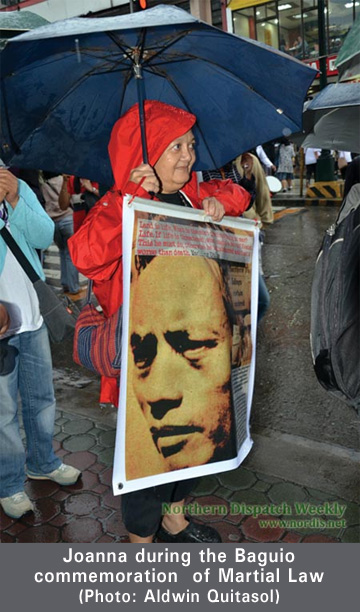 23 September 2012
23 September 2012The semi-colonial and semi-feudal system breeds revolutionary families. There are eight of us in the family and even before martial law, five of us were already activists. The three younger ones also became activists when they grew older during the martial law era.
When martial law was declared, four of us went underground. My older sister Jingjing, Ka Maria, is a martyr to the revolutionary cause. Together with my younger sister Joji, I was illegally arrested, tortured, and detained without charges for two years, from 1974-76.
One day, the detention area in Camp Olivas was suddenly overcrowded with what seemed to be about a hundred new detainees, some of them clad only in g-strings. The news was that they were resisting the Chico dam project. The Marcos dictatorship was hellbent on building four huge dams along the Chico river which would have displaced many indigenous communities in Bontoc and Kalinga from their ancestral lands. Furthermore, the Marcos dictatorship had awarded 200,000 hectares of ancestral forest lands in Abra to his cronies as a logging and paper pulp concession. Chico and Cellophil were so-called priority “development projects” of the Marcos dictatorship throughout the dark years of martial rule.
Upon release from detention, I returned to Baguio City and was inspired by the growing people’s resistance to Chico and Cellophil. I attended bodong conferences where the tribal elders would exhort their people to unite and defend their ancestral lands and their indigenous way of life. In these gatherings, cultural activities always played a big role. Traditional forms of song and dance such as the sallidummay, uggayam, ullalim were performed but infused with new revolutionary content. The traditional bodong which is a bilateral peace pact between two tribes transformed into a multi-lateral bodong in the effort to unite all the communities that would be affected.
Martial law breeds resistance and revolution. The period from the mid-seventies to the mid-eighties was a decade of ferment and upheaval throughout the Cordillera region. The indigenous peoples relied on their tribal practice of concerted and unified mass action as they increasingly asserted their collective rights even under conditions of martial rule and intense militarization in the countryside. When they finally resorted to armed resistance after peaceful methods to seek redress of grievances had proved futile in the face of unbridled militarization, this was but a logical step for these warrior societies in the defense of their life, land, livelihood and resources.
On April 24, 1980, military troops of the Marcos dictatorship gunned down Macliing Dulag of the Butbut tribe, in Bugnay, Tinglayan, Kalinga. Macliing was one of the leaders of the opposition to the Chico dams. He was killed in the dead of night in an effort to intimidate the growing resistance. The people refused to be cowed. Instead, Macliing’s death was commemorated with a Macliing memorial yearly thereafter to remember the martyrs who had given up their lives in the struggle.
One month after Macliing’s murder, an International Fact-Finding Mission arrived in Tinglayan to investigate the case. This was participated in by human rights personalities such as Senators Diokno and Tañada, church leaders and many others, and was widely covered by the media. Every year thereafter, a Macliing Memorial was organized to honor Macliing and the other martyrs who had given up their lives in the struggle. In 1985, April 24 was commemorated as Cordillera Day for the first time.
Chico and Cellophil ignited dormant Igorot nationalism. Numerous activists and mass leaders espousing their rights as indigenous peoples emerged. The different Cordillera tribes were challenged into the recognition of the pressing need for a greater unity among themselves if they hoped to succeed in the defense of their collective human rights. Igorot students and intellectuals put their energies into the more serious study and advocacy of indigenous peoples rights. This increased introspection and self awareness among the indigenous peoples of the Cordillera paved the way towards a pan-Cordillera mass movement, as it marked the shift from spontaneous reaction to conscious and concerted unified action. As the different Igorot tribes and sectors were increasingly exposed to each other in mass meetings, inter-tribal activities and bodong conferences, there was the opportunity for dialogue and mutual sharing and learning.
The heroic Chico and Cellophil struggles also served to inspire and motivate many non-indigenous advocates, in the region, the nation, and abroad, which made it possible to generate broad national and international support to sustain the growing mass movement. Chico and Cellophil brought to the fore the fact that the present-day problems of tribal peoples and indigenous communities are much bigger and more complicated than any faced in earlier historical periods. More concretely, Chico and Cellophil showed the indigenous peoples of the Cordillera that their problems cannot be taken in isolation from the wider Philippine realities, and the incursions of imperialist globalization.
The indigenist romanticized view of tribal society as a static autonomous entity which should be preserved in its pure form shattered, as Igorots united with as broad an alliance as possible for the defense of indigenous rights. Although the resistance at the start was the spontaneous tribal response to outside threat, it soon positioned itself firmly within the mainstream of the national democratic struggle.
These Bontok, Kalinga and Tinggian communities, considered by many as among the most neglected and powerless sectors of Philippine society, showed the world indigenous people’s power in their steadfast and uncompromising defense of their human rights. The popular resistance to Chico and Cellophil inspired the formation of a militant mass movement for the defense of ancestral domain and for self-determination in the Cordillera, within the framework of the wider national democratic mass movement. And thus was the Cordillera People’s Alliance born. # http://nordis.net
 Home | Aims and Objectives of Solidarity Philippines Australia Network | About Kasama
Home | Aims and Objectives of Solidarity Philippines Australia Network | About Kasama 
Search the SPAN Web